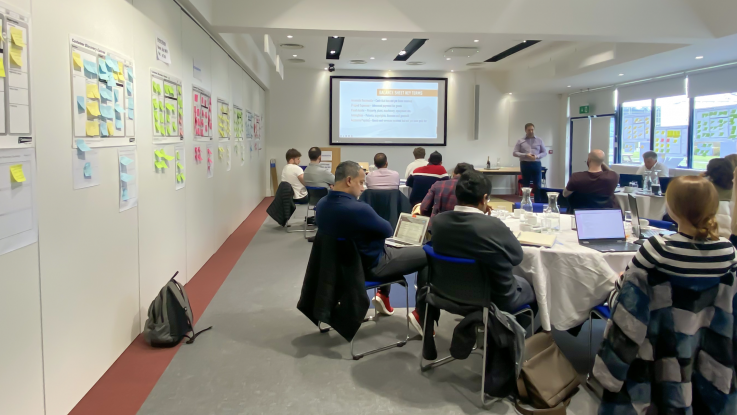

Shooting For The Moon
David Bream and Robert Dent have spent many years working with entrepreneurs to help them realise their dreams. The pair came together to share and contrast their experiences of growing successful commercial enterprises, and here, we cover the most frequently asked questions.
Should we grow organically or seek investment? “Organic growth is the nirvana; great if you can get there. However, it is really hard work and requires very careful cashflow management. Service businesses can scale really well in this way,” comments Robert, who grew several of his early enterprises organically.
David says: “Growing organically to a point before raising money is always a good idea. Once you’ve established some customers and it’s clear that they value what you are offering, then it is a sensible time to raise investment. If you’re a pre-revenue technology business, I’d recommend grant funding initially. This enables you to attract key staff and secure intellectual property – deliver the proof points if you like – that your future investors will want to see.”
At what stage should we get advisors onboard? “I don’t think there’s any business stage when you wouldn’t want external advice,” answers David. “Even in the early stages when you’re developing your business plan, get input. Many people set themselves up in business because they want to be the boss and they’re worried that getting an advisor or putting a Board together will chip away at this influence and there’s often nervousness around not having all the answers and want to guard their ideas. However, for the relatively small amount of time advisors offer, they deliver huge value. The reality is that when people of a certain stature are willing to attach themselves to a business, that business has greater stature itself.”
Robert agrees: “If your business has potential, you don’t always have to go and find advisors and investors. If you’re really good at what you’re doing, they will find you.”
What is preventing us from growing? “I believe I have identified four particular blockages to high growth,” says David.
“The first is that I see companies struggling to transition from first orders to a full sales and marketing machine that generates more business in a controlled, organised and customer-focused way. The second thing I see a lot is companies taking on their first employees and they all report to the founder as a flat organisation, but functional specialisms are critical to achieving growth. My third observation is securing funding beyond a couple of hundred thousand pounds – it’s a very different proposition to securing early grants. And finally, there’s a reluctance to create a Board structure but, when making the above transitions, there’s a real need for oversight and governance.”
Which of these four blockages should we address first? “Definitely sales and marketing,” advises Robert. “Always remember that ‘marketing’ includes market research to understand market size and value proposition. Without this focus, you simply don’t know what customers are out there, how to engage them and how to get your pricing right.”
He continues: “Founders are often tied to their initial ideas about the value of their product and company and this is usually linked to the value of their homes because it’s the largest transaction they’ve been involved in to date. However, when you have early adopter customers and have proved your product, working with pricing and margins are key opportunities for growth.”
David agrees, adding, “You have to sell your business to attract the right calibre of sales support. It’s really important to build a team that is focused on the future and that share the mission and vision. My advice is not to look for a senior sales leader who expects the ultimate remuneration package, or a junior who will take up too much of an entrepreneur’s time, but someone in between. Someone with a good track record that has been selling for say, five to seven years is a good bet. Consider share options to attract people that are fully invested in the success of the business.”
How should we go about approaching investors and advisors? “Don’t be shy,” suggests David. “Investors are usually very empathetic and receptive to approaches from entrepreneurs because they’ve probably been one themselves and they like to give back.”
Robert agrees. “Shoot for the moon! You may be surprised at who is willing to engage with you. There are many entrepreneurs and investors that will give their time simply because they love working in this space. However, be clear about what you want from them in your approach and use their time wisely.
“When you go into fast growth, its super important to make conscious rather than unconscious decisions. People will start approaching you with many ideas and opportunities. These require careful monitoring to ensure that the company is developing in the way that you want it to. This is where a Board helps to keep a business on track.”
“Yes! I have nothing but respect for people that shoot for the moon!” says David. “I advise companies to behave like little corporates, even when they’re a single person. Have a board meeting every month because this gets you into the habit of taking regular, strategic reviews of finance, sales and operations. Records of these meetings validate forecasts, strengthen credibility and maximise investability.”
“As you build towards a full Board, aim to work with as diverse a group of people that you possibly can to avoid ‘group think’. A key challenge is breaking out of patterns and conditioning established in the early days of a business. It is perfectly possible to have a very diverse organisation that retains a strong, cohesive value set.”
How can SETsquared Southampton help us grow? David concludes: “What we do and who is involved with SETsquared programmes is really important. Our grants simply ‘oil the wheels’; the real value is in the expert interventions. I want SETsquared Southampton to be as accessible as possible so it’s a really easy application process to get involved in the Business Growth Programme. Simply articulate what you consider to be your obstacles to growth, and we’ll take the conversation forward with you.”















































































